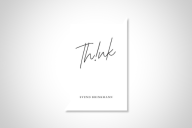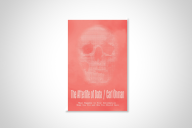You have /5 articles left.
Sign up for a free account or log in.
Examples of atheist spiritual autobiography are not plentiful, although the idea is not as self-contradictory as it perhaps sounds. A quest story that ends without the grail being located or the ring destroyed may not satisfy most audiences, but it's a quest story even so.
The one example that comes to mind is Twelve Years in a Monastery (1897) by Joseph McCabe, an English Franciscan who spent much of his clerical career grappling with doubts that eventually won out. Twelve Years is framed mainly as a critique and expose of clerical life, but its interest as a memoir comes in part from McCabe’s struggle to accept the moral and intellectual demands imposed by his growing skepticism. For all of its defects, monasticism offered a career in which McCabe’s talents were recognized and even, within ascetic limits, rewarded. Leaving it meant answering the call of a new vocation: He went on to write on an encyclopedic array of scientific, cultural and historical topics.
McCabe also became the translator and primary English spokesman for Ernst Haeckel, the German evolutionary theorist and advocate of pantheism, which seems to have squared easily enough with the lapsed monk’s atheism. (There may be more than a semantic difference between thinking of God and the universe as identical and believing there is no God, just universe. But if so, it is largely in the eye of the beholder.)
Barbara Ehrenreich’s background could not be more different from Joseph McCabe’s. In Living With a Wild God: A Nonbeliever’s Search for the Truth About Everything (Hachette/Twelve) she describes her working-class family as consisting of atheists, rationalists, and skeptics for at least a couple of generations back. “God is an extension of human personality,” she wrote in her journal as an adolescent, “brought into the world and enslaved as man’s glorifier.” McCabe would have had to do penance for such a thought; in Ehrenreich’s case, it was just dinner-table wisdom -- expressed with precocious verbal finesse, later honed into a sharp instrument of social criticism put to work in Nickle and Dimed, among other books.
Her memoir appeared two years ago, though I’ve only just read it, making this column more rumination than review. The usual blurb-phrases apply: it’s brilliantly written, thought-provoking, and often very funny, taking aphoristic turns that crystallize complex feelings into the fewest but most apt words. For example: “[I]f you’re not prepared to die when you’re almost 60, then I would say you’ve been falling down on your philosophical responsibilities as a grown-up human being.” Or: “As a child I had learned many things from my mother, like how to sew a buttonhole and scrub a grimy pot, but mostly I had learned that love and its expressions are entirely optional, even between a mother and child.”
So, a recommended read. (More in the reviewerly vein is to be found here and here.) Additional plaudits for Living With a Wild God won’t count for much at this late date, while its literary ancestry might still be worth a thought. For it seems entirely possible, even likely, that Ehrenreich’s parents and grandparents in Butte, Montana would have read McCabe -- “the trained athlete of disbelief,” as H.G. Wells called him, in recognition of McCabe’s countless books and pamphlets on science, progress and the benefits of godlessness. Many of them appeared in newsprint editions circulating widely in the United States during the first half of the 20th century, with one publisher reckoning he’d sold over 2.3 million booklets by McCabe between the 1920s and the 1940s.
The inner life she led as a teenager that Ehrenreich depicts in her memoir certainly resembles the world of rationality and order that McCabe evokes, and that her family took as a given: “[E]very visible, palpable object, every rock or grain of sand, is a clue to the larger mystery of how the universe is organized and put together -- a mystery that it was our job, as thinking beings, to solve.” Ehrenreich took up the challenge as an adolescent with particular rigor. Faced with the hard questions that death raises about the value and point of life, she began taking notes in the expectation of working out the answer: “I think it is best to start out with as few as possible things which you hold to be unquestionably true and start from there.”
The problem, as Descartes discovered and Ehrenreich did soon, was that “the unquestionably true” is a vanishingly small thing to determine. You are left with “I exist” and no path to any more inclusive confidence than that. Descartes eventually posits the existence of God, but arguably bends the rules in doing so. Ehrenreich does not and lands in the quicksand of solipsism.
The mature Ehrenreich can see how her younger self’s philosophical conflicts took shape in the midst of more mundane family problems involving alcoholism, career frustration and each parent’s set of inescapable disappointments. (After all, solipsism means never having to say you’re sorry.) But she also recognizes that the quandaries of her teenage prototype weren’t just symptoms: “Somehow, despite all the peculiarities of my gender, age class, and family background, I had tapped into the centuries-old mainstream of Western philosophical inquiry, of old men asking over and over, one way or another, what’s really going on here?”
In pursuing answers that never quite hold together, she undergoes what sounds very much like the sort of crisis described by the saints and mystics of various traditions. First, there were repeated moments of being overwhelmed by the sheer strangeness and “there”-ness of the world itself. Then, in May 1959, a few months before leaving for college, she underwent a shattering and effectively inexpressible experience that left her earlier musings in ashes. No consciousness-altering chemicals were ingested beforehand; given the circumstances, it is easy to appreciate why the author spent the 1960s avoiding them:
“[T]he world flamed into life,” she writes. “There were no visions, no prophetic voices or visits by totemic animals, just this blazing everywhere. Something poured into me and I poured out into it. This was not the passive beatific merger with ‘the All,’ as promised by the Eastern mystics. It was a furious encounter with a living substance that was coming at me through all things at once, and one reason for the terrible wordlessness of the experience is that you cannot observe fire really closely without becoming part of it.”
This kind of thing could not be discussed without the risk of involuntary commitment, and Ehrenreich herself refers to a medical hypothesis suggesting that ecstatic states may result when “large numbers of neurons start firing in synchrony, until key parts of the brain are swept up in a single pattern of activity, an unstoppable cascade of electrical events, beginning at the cellular level and growing to encompass the entire terrain that we experience as ‘consciousness.’”
Ehrenreich did not take McCabe’s course in reverse -- going from atheist into the waiting arms of an established faith. For that matter, she remains more or less an agnostic, at least willing to consider the possible merits of a polytheistic cosmos. "My adolescent solipsism is incidental compared to the collective solipsism our species has embraced for the last few centuries in the name of modernity and rationality," she writes, "a worldview in which there exists no consciousness or agency other than our own, where nonhuman animals are dumb mechanisms, driven by instinct, where all other deities or spirits have been eliminated in favor of the unapproachable God...." Whether a nonreligious mysticism can go beyond "modernity and rationality" without turning anti-modern and irrationalist is something we'll take up in the column on a future occasion.








